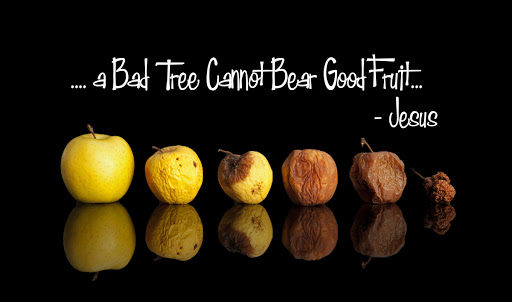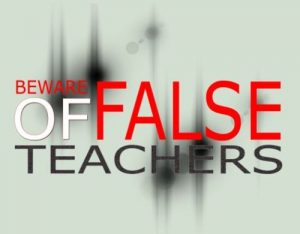In John 15:1-8, Jesus talks about the importance of the branches abiding in the vine in order to produce fruit. If branches do not produce good fruit, they will be burned. Is Jesus saying that if Christians do not have good works they will be sent to hell? No! Not at all. Listen to the study to see what Jesus IS teaching and why this is important for properly understanding the gospel.
This study is an excerpt from my Gospel Dictionary online course. This course considers 52 key words of the Gospel and thousands of biblical texts. The course contains over 100 hours Bible teaching. You can take the course by joining my online discipleship group.
What is the “Good Fruit” of John 15:1-8?
I am the true vine, and My Father is the vinedresser. Every branch in Me that does not bear fruit He takes away; and every branch that bears fruit He prunes, that it may bear more fruit. You are already clean because of the word which I have spoken to you. Abide in Me, and I in you. As the branch cannot bear fruit of itself, unless it abides in the vine, neither can you, unless you abide in Me.
I am the vine, you are the branches. He who abides in Me, and I in him, bears much fruit; for without Me you can do nothing. If anyone does not abide in Me, he is cast out as a branch and is withered; and they gather them and throw them into the fire, and they are burned. If you abide in Me, and My words abide in you, you will ask what you desire, and it shall be done for you. By this My Father is glorified, that you bear much fruit; so you will be My disciples (John 15:1-8).

The imagery of the vine and the branches in John 15:1-8 has caused many to believe and teach that any Christian who does not have good works will either end up in eternal hell, or will prove that they were never truly a Christian in the first place. This application of the text is based on a misunderstanding of four terms: abide, disciple, fire, and fruit.
The Meaning of the Word “Abide”
The term abide is a term of fellowship and intimacy. When you abide with someone, you live with them, remain with them, and spend time with them.
 Such connectedness is not automatic in the life of the believer. Just as it is possible to be related to someone while not being in fellowship with them, so also, it is possible to be in the family of God without remaining or abiding in fellowship with God, with Jesus, and with other believers.
Such connectedness is not automatic in the life of the believer. Just as it is possible to be related to someone while not being in fellowship with them, so also, it is possible to be in the family of God without remaining or abiding in fellowship with God, with Jesus, and with other believers.
In the context here, Jesus is telling some of His believers why it is important to remain in close fellowship with Him. The only way to be a good and successful disciple of Jesus is to remain in close connection to Jesus.
The Meaning of the Word “Disciple”
The term disciple is not equivalent to believer, but instead refers to all those who have chosen to follow Jesus, obey His commands, and do what He says. Because of this, it is possible to be a disciple of Jesus without having eternal life, and it is also possible to have eternal life without being a disciple.
Eternal life is freely given to anyone who simply and only believes in Jesus for it. But the path of discipleship has numerous conditions and requirements, which anyone can attempt to achieve. In the context of John 15, Jesus is telling eleven believers—who have also been His disciples for three years—how they can continue to be His disciples after He leaves.
And He not only wants them to continue on as His disciples, but to be fruitful and successful as disciples. Abiding, or remaining, in close fellowship with Jesus is the key to successful discipleship.
But not all disciples are successful. Some fail. Some turn away. Some follow for a time and then stop. Such failure says nothing one way or the other about whether or not a person has eternal life.
Again, eternal life is given by God to anyone who simply and only believes in Jesus for it. Discipleship is not a requirement for gaining or keeping eternal life.
This does not mean, however, that there are not negative consequences for failing to follow Jesus. There are. Fire is one of them.
The meaning of the word “Fire”
In the context here, Jesus says that those disciples who fail to abide in Him and produce fruit will be thrown into the fire and burned. This does not refer to eternal punishment in the flames of hell, but to some sort of temporal discipline in the life. Their life will be full of emptiness and vain pursuits, with all their dreams and aspirations amounting to nothing but a heap of ash to be blown away by the wind.
The only way to be truly successful in life is to follow Jesus and remain in close fellowship with Him.
The meaning of the word “Fruit”
When the terms abide, disciple, and fire are understood as briefly outlined above, the term fruit makes a lot more sense in context. With this term, Jesus is referring to the good works that His disciples will produce through close fellowship with Him.

In reality, Jesus will produce His good works in and through them. By themselves, disciples can do nothing. Just as branch can do nothing by itself, but must be connected to the vine, so also, a disciple must remain in close connection to Jesus in order to produce fruit.
Note, of course, that they good fruit may not be evident to others. After all, while some good works may be tainted with the invisible sins of pride and arrogance, numerous good works may not be seen by others at all. In fact, much of the fruit that Jesus produces in the lives of His disciples is evident only to Him, as slowly, over time, He changes their inner character. Furthermore, many of the good works that Jesus performs in believers are those that are done quietly behind the scenes, so that even someone’s left hand doesn’t know what their right is doing (Matthew 6:3).
Therefore, while the fruit of John 15:1-8 does refer to good works and positive character qualities, there is still no instruction here for Christians to become fruit inspectors in the lives of other people. We cannot use good works (or their absence) to determine anything about someone else’s (or even our own!) eternal destiny.
Jesus is saying that if you and I want to be a good disciple, a successful disciple, a fruitful disciple, then we should abide and remain with Him, listen to His teachings and instructions, doing what He says and imitating what He does. In this way, we will be disciples that bear much fruit and experience the rule and reign of God in our lives.
 Understanding the Gospel requires us to properly understand the key words and terms of the Gospel. Take my course, "The Gospel Dictionary" to learn about the 52 key words of the Gospel, and hundreds of Bible passages that use these words.
Understanding the Gospel requires us to properly understand the key words and terms of the Gospel. Take my course, "The Gospel Dictionary" to learn about the 52 key words of the Gospel, and hundreds of Bible passages that use these words.
This course costs $297, but when you join the Discipleship group, you can to take the entire course for free.




 Matthew 12:33-37 (and the parallel passage in Luke 6:43-45) is a key passage for understanding the symbolic use of fruit in Scripture.
Matthew 12:33-37 (and the parallel passage in Luke 6:43-45) is a key passage for understanding the symbolic use of fruit in Scripture.
 The biblical teachings about good and bad fruit don’t even apply to the average person who is generally uniformed or uneducated about what the Bible teaches. Instead, the warnings from Scripture about good and bad fruit primarily apply to those whose job it is to teach others about Scripture and theology.
The biblical teachings about good and bad fruit don’t even apply to the average person who is generally uniformed or uneducated about what the Bible teaches. Instead, the warnings from Scripture about good and bad fruit primarily apply to those whose job it is to teach others about Scripture and theology.



 It is important to note that this passage, like many of the others about fruit, applies only to prophets and teachers. Jesus is not giving a blanket statement here about judging the average person.
It is important to note that this passage, like many of the others about fruit, applies only to prophets and teachers. Jesus is not giving a blanket statement here about judging the average person. So neither the reference to fire nor the reference to the kingdom of God have anything to do with eternal destiny, but everything to do with what we experience now in the life based on what sort of teachings we hear and whether or not we follow such teachings.
So neither the reference to fire nor the reference to the kingdom of God have anything to do with eternal destiny, but everything to do with what we experience now in the life based on what sort of teachings we hear and whether or not we follow such teachings.
 The three terms are faith, save, and dead. These three key terms in James 2:14-26 help bring clarity to this much-debated text.
The three terms are faith, save, and dead. These three key terms in James 2:14-26 help bring clarity to this much-debated text. If you are genuinely concerned about the poor and hungry in your midst, it is fine to believe that God can do something about it, if you also believe that God is going to do something about it through you.
If you are genuinely concerned about the poor and hungry in your midst, it is fine to believe that God can do something about it, if you also believe that God is going to do something about it through you.
 When a person’s spirit leaves their body, does this mean that the body does not exist, or that it never existed? No, of course not. The body is still there, even after the spirit departs. But the body is no longer accomplishing the purpose and goal which God intended for it.
When a person’s spirit leaves their body, does this mean that the body does not exist, or that it never existed? No, of course not. The body is still there, even after the spirit departs. But the body is no longer accomplishing the purpose and goal which God intended for it. Only in this way does our faith get put into practice and fulfill the plans and goals of God.
Only in this way does our faith get put into practice and fulfill the plans and goals of God.

 But where did this list come from? It seems to have been cherry-picked from various verses in the Bible. Why are these often the types of good works people look for in others? Because these are the types of good works that pastors and church leaders want in the people who attend their church.
But where did this list come from? It seems to have been cherry-picked from various verses in the Bible. Why are these often the types of good works people look for in others? Because these are the types of good works that pastors and church leaders want in the people who attend their church.

